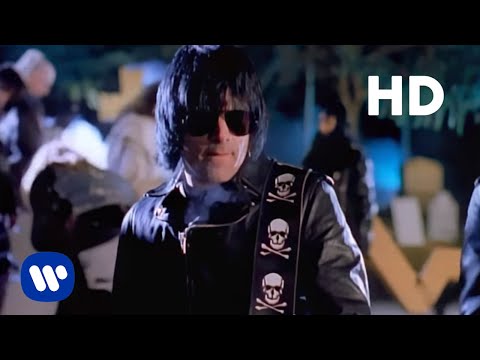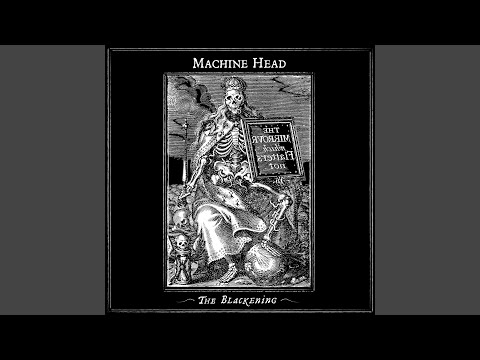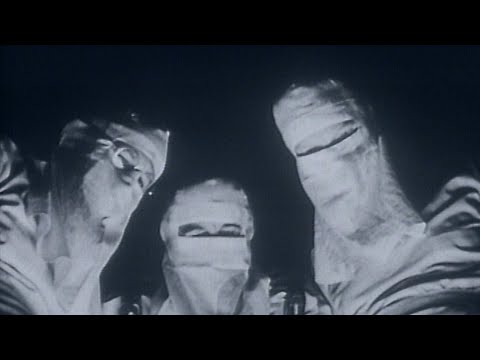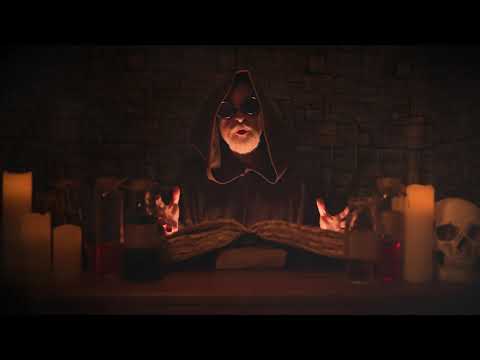Discovering what stories influenced certain songs, however, can be fascinating not just for the insight it provides into the songs themselves, but for what it tells of the creative process behind the compositions and the individuals responsible. Whether you’re familiar with the songs in this list and the books behind them or not, you’re sure to learn something interesting. Let’s get to it, then 10 Rock And Metal Musicians Who Killed Someone
10 Paranoid Android – Radiohead (1997)
Radiohead’s 1997 album Ok Computer stands out as one of the top alternative albums of the ’90s – they’ve got the Grammy to prove it. The record is packed with unique, stylistically innovative tracks, and Paranoid Android is arguably the best of the bunch. The song was inspired by Douglas Adams’ sci-fi novel A Hitchhikers Guide to the Galaxy, and is told from the perspective of Marvin – a robot deeply depressed at having his infinite intelligence wasted on mundane, everyday tasks. Wrapped within the six and a half minute tune, we find not just unusual chord progressions, catchy transitions, and Thom Yorke’s haunting vocals, but a relatable story of unrealized potential and fantasies of vengeance that closely mirror Yorke’s own personal experiences. And the influence of Adams’ work extends beyond just the song. The title of the album comes directly from a line in the story – a fitting nod to the author’s creative genius by a band whose musical innovation could be described as the same.[1]
9 Pet Sematary – The Ramones (1989)
The Ramones are known today as one of the pioneers of the punk rock genre, and it was their ’89 hit Pet Sematary, written for the movie based on the horror novel by Stephen King, that helped propel them to greatness. Opinions of the song are largely divided. Some people love it, some hate it. Regardless of which camp you fall into, it’s hard to deny that the tune, written in the band’s distinctive 3-chord style, is pretty catchy and does a fair job of incorporating the subject matter of the story upon which it’s based. Speaking of the story, it’s well known that King is a big fan of The Ramones and he mentions them several times in the book. Fitting then, that they were chosen to write the song. Legend has it that Dee Dee Ramone penned the tune in the author’s basement after reading an early draft of Pet Sematary, but King himself has subsequently rubbished the claims. The movie has since been remade but, sadly (or not, depending on your musical preferences) the song was not featured in the 2019 release.[2]
8 Scentless Apprentice – Nirvana (1993)
Whether you admire his musical work or not, it’s hard to deny that Kurt Cobain falls squarely into the category of tortured genius. Given his untimely death by suicide at an early age, it’s easy to look back at his songs and identify proof of the mental anguish that would cause him to take his own life. And while one could argue that it’s certainly there, one of Nirvana’s more disturbing songs, Scentless Apprentice, is based not on Cobain’s personal experience but rather on the novel Perfume, by Patrick Suskind – a story about a man born with an incredible sense of smell but no scent of his own, who takes to murdering young women for their scent. The track is full of the raw, emotional power that defines the entire In Utero album, and the heavy-handed drumbeat and edgy guitar riff, both devised by Dave Grohl, give it a disturbing, frantic quality that fits perfectly with the dark subject matter. The star of this show, however, is Cobain on vocals. As he did so often in his short career, he elevates the song with unrestrained yet melodic screeching, making this not just a great tune, but a fan favorite live performance as well.[3]
7 A Farewell to Arms – Machinehead (2007)
Machinehead set the metal world alight with the release of their 2007 album The Blackening, easily one of the best heavy metal compilations of recent time, possibly ever. Something just clicked for the Oakland boys on this one – the unique use of drop-B tuning gives it a heavier tone and feel even for the genre, the musical interplay and dynamic use of dueling guitar solos ups things a notch further, and Robb Flynn’s incredibly versatile vocals round out each and every song on the album perfectly. One of the standout tracks on a record full of them is A Farewell to Arms. You could rightly call this 10-minute long tour de force a ‘power ballad’ although, by the time the gentle, melodic beginning develops into the full-fledged churching power chords and in-your-face style Machinehead are known for, it’s definitely more power than ballad. The title of the track comes from Ernest Hemmingway’s iconic WWI novel, and whilst the song deals with the topic of war and destruction in a more general sense than did the novel, and omits and references to love entirely, the common theme and the name itself make it clear where the inspiration for this one came from.[4]
6 Sympathy for the Devil – The Rolling Stones (1968)
One of the most iconic rock songs in history, this classic is the only Stones song solely credited to Mick Jagger, and firmly cemented the band’s occult orientated reputation. This wasn’t helped when a group of the band’s biker bodyguards stabbed a young man at a concert during a live performance of the song a year after its release. The truth, however, is the legendary song was based not on devil-worship or Satanism, but rather on a classic Russian novel, The Master and Margarita, by Mikhail Bulgakov . While soviet-era Russian literature is typically dark and depressing, Bulgakov’s story is just the opposite. Taking a light-hearted look at what would happen if the devil, a debonair gentleman, had visited the USSR during Stalin’s reign, the book blends humor and magical realism in a way similar to another contemporary great, Japan’s Haruki Murakami. The Stone’s song builds on the theme, showing the devil – a man of wealth and taste – visiting various defining world events in history, from the crucifixion of Christ to the second world war and beyond. The intriguing subject matter makes the song worth listening to alone, but the musical elements present, from the distinctive African-sounding drumbeat, the instantly recognizable ‘hoo-hooing’ pre-verse, Keith Richards’ minimalist guitar solo, and, of course, Jagger with his typical vocal flourishes are what makes this number one of the most recognizable pieces of rock music in the world.[5] 10 Weird Jobs That Legendary Rockers Had Before Becoming Famous
5 One – Metallica (1988)
Metallica are no strangers to literature inspired music. From Hemmingway to King, Lovecraft, and even the Bible, written works have appeared in their songs throughout the band’s decades-long career. A metal classic, and featuring one of the greatest guitar solos of all time, their ’88 song One is a brutal portrayal of the ravages of war and was directly inspired by Donald Trumbo’s famous anti-war novel, Johnny Got His Gun. The story concerns a World War 1 soldier who wakes up in hospital and gradually realizes he’s had his arms and legs amputated and has lost all his senses. The song presents this nightmarish perspective chillingly in both the melodic verses and the emotion-ridden chorus line ‘Hold my breath as I wish for death/Oh please god wake me.’ By the time we reach the lyrical crescendo just before the solo, the listener is fully immersed in the plight of the soldier, the One, and the cruel, senseless anguish of war. As good as the original recording was, the band somehow seems to improve the song with each new playing which is why it remains one of their favorites and a staple of every live Metallica set even now, over 30 years on from its release.[6]
4 Resistance – Muse (2009)
George Orwell’s famous dystopian novel, 1984, is one of the most widely read books of the last century, and some see the social science fiction construct as an ominous foreshadowing of where the world is swiftly heading. Political commentary aside, the story, at heart, is about love, and award-winning British alternative band Muse portrays this excellently in their Orwell inspired song, Resistance. The novel had a massive impact on Muse frontman Matt Bellamy, and the song, with the lyrics, ‘Love is our resistance’ perfectly captures the essence of the story – Winston Smith’s ill-fated love affair with the mysterious Julia. In a society where a totalitarian regime controls everything, and even individual thought is policed, is not love the ultimate act of resistance? Orwell portrays this masterfully in the story and Muse, with Bellamy’s distinctive vocals and astute lyrical construction, presents a powerful song that is a fitting companion to one of the defining novels of the last hundred years.[7]
3 Rocket Man – Elton John (1972)
Rocket Man is one of Elton John’s most popular songs, so much so that it was chosen as the title for the musician’s recent biographical film. Space exploration was a big deal when the song was released back in 1972 when the Apollo missions were ongoing, and John is often accused of stealing the idea for this song from another space-based classic by David Bowie. But, Bernie Taupin, the man who wrote the lyrics for Rocket Man, got his inspiration instead from the Ray Bradbury short story of the same name. The story is told from the perspective of a child who’s astronaut father is conflicted about leaving his family behind and venturing to the stars, and whilst that is the basis of the lyrical contents of the song as well, the whole thing also forms an astute extended metaphor of the meteoric rise to stardom that musicians, or anyone famous, experiences. From the obligatory drug use (I’m gonna be high as a kite by then) to the isolation that comes with rising to the top (It’s lonely out in space), the challenges of family life (Mars ain’t the kind of place to raise your kids), the lyrics mirror not just Bradbury’s story but John’s musical journey as well and combines a literary masterpiece with a stark look at the realities of life in the spotlight.[8]
2 The Rime of the Ancient Mariner – Iron Maiden (1984)
Iron Maiden, no strangers to literary-inspired songs, did something quite special when they retold Samuel Taylor Coleridge’s epic 1779 poem The Rime of the Ancient Marnier in a song of the same name on their excellent 1984 album Powerslave. Rather than incorporating the general idea of the poem in the song, the band chose to retell the tale in its entirety, complete with some of the poet’s original lines, and did so in the crunching, fast-paced metal style that has since seen them acknowledged as one of the founding acts of the heavy metal genre. Both poem and song concern a naval captain who has a profound experience at sea and, having survived against the odds, goes about telling his story to anyone who’ll listen. The moral of said story being: love all of God’s creatures. Not exactly what one would expect from a band responsible for classics like, The Number of the Beast and Bring your Daughter to the Slaughter. But then it does involve an encounter with Death, animated corpses, and a pesky albatross, so it’s right up Iron Maiden’s dark, twisted alley. The song tends to get lost in amongst the band’s wealth of excellent offerings over the years, but any fan of the genre or 18th-century classical poetry (or both) would do well to check it out.[9]
1 The Alchemist – Blue Oyster Cult (2020)
Yes, they’re back. Over 57 years since they first formed, legendary rock outfit BOC has proven, once and for all, that they are one of the most underrated bands in history, and the fact that they haven’t yet been inducted into the Rock ‘n Roll Hall of Fame is an ongoing travesty. But never mind. Their most recent album, The Symbol Remains, is a throwback to everything that made the band great to begin with and I’m going to go out on a limb here and call it one of the best albums of the year. Period. The Symbol Remains is packed with a wide array of incredible songs and The Alchemist, which feels like a classic 80’s metal tune, is one of the best. Based on H.P Lovecraft’s early short story, The Alchemist is a retelling of a chilling tale of betrayal and murderous revenge between a French noble and a wicked sorcerer. The song drips with the same dark malevolence Lovecraft was a master at depicting. Everything from the haunting keyboard intro to the crashing power chords and Buck Dharma’s electrifying solo exudes a sense of magical evil, and when Eric Bloom croons the pre-chorus line transplanted whole from the story, chills are sure to ensue. It’s not too surprising that this song is so good – BOC and Lovecraft make for a perfect combination and the result speaks (or shrieks) for itself.[10] Top 20 Best Rock Bands Of All Time About the author: I’m 32 years old and I live in South Africa. I work full time in logistics and I’m a freelance writer in my (limited) spare time. I have various projects in the works, including a potential novel, and I regularly participate in the Reedsy Prompts short story contest, where a growing collection of my work is available for reading. I have been a shortlisted finalist there twice so far.
























